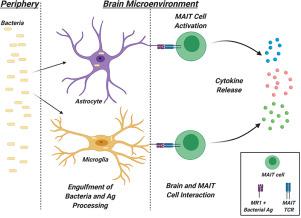当前位置:
X-MOL 学术
›
J. Neuroimmunol.
›
论文详情
Our official English website, www.x-mol.net, welcomes your
feedback! (Note: you will need to create a separate account there.)
Brain astrocytes and microglia express functional MR1 molecules that present microbial antigens to mucosal-associated invariant T (MAIT) cells
Journal of Neuroimmunology ( IF 2.9 ) Pub Date : 2020-12-01 , DOI: 10.1016/j.jneuroim.2020.577428 Raj Priya 1 , Randy R Brutkiewicz 1
Journal of Neuroimmunology ( IF 2.9 ) Pub Date : 2020-12-01 , DOI: 10.1016/j.jneuroim.2020.577428 Raj Priya 1 , Randy R Brutkiewicz 1
Affiliation

|
It is unknown whether brain astrocytes and microglia have the capacity to present microbial antigens via the innate immune MR1/MAIT cell axis. We have detected MAIT cells in the normal mouse brain and found that both astrocytes and microglia are MR1+. When we stimulated brain astrocytes and microglia with E. coli, and then co-cultured them with MAIT cells, MR1 surface expression was upregulated and MAIT cells were activated in an antigen-dependent manner. Considering the association of MAIT cells with inflammatory conditions, including those in the CNS, the MR1/MAIT cell axis could be a novel therapeutic target in neuroinflammatory disorders.
中文翻译:

脑星形胶质细胞和小胶质细胞表达功能性 MR1 分子,将微生物抗原呈递给粘膜相关不变 T (MAIT) 细胞
目前尚不清楚脑星形胶质细胞和小胶质细胞是否具有通过先天免疫 MR1/MAIT 细胞轴呈递微生物抗原的能力。我们在正常小鼠大脑中检测到 MAIT 细胞,发现星形胶质细胞和小胶质细胞都是 MR1+。当我们用大肠杆菌刺激脑星形胶质细胞和小胶质细胞,然后将它们与 MAIT 细胞共培养时,MR1 表面表达上调,MAIT 细胞以抗原依赖性方式被激活。考虑到 MAIT 细胞与炎症性疾病(包括 CNS 中的那些)的关联,MR1/MAIT 细胞轴可能是神经炎症性疾病的新治疗靶点。
更新日期:2020-12-01
中文翻译:

脑星形胶质细胞和小胶质细胞表达功能性 MR1 分子,将微生物抗原呈递给粘膜相关不变 T (MAIT) 细胞
目前尚不清楚脑星形胶质细胞和小胶质细胞是否具有通过先天免疫 MR1/MAIT 细胞轴呈递微生物抗原的能力。我们在正常小鼠大脑中检测到 MAIT 细胞,发现星形胶质细胞和小胶质细胞都是 MR1+。当我们用大肠杆菌刺激脑星形胶质细胞和小胶质细胞,然后将它们与 MAIT 细胞共培养时,MR1 表面表达上调,MAIT 细胞以抗原依赖性方式被激活。考虑到 MAIT 细胞与炎症性疾病(包括 CNS 中的那些)的关联,MR1/MAIT 细胞轴可能是神经炎症性疾病的新治疗靶点。











































 京公网安备 11010802027423号
京公网安备 11010802027423号